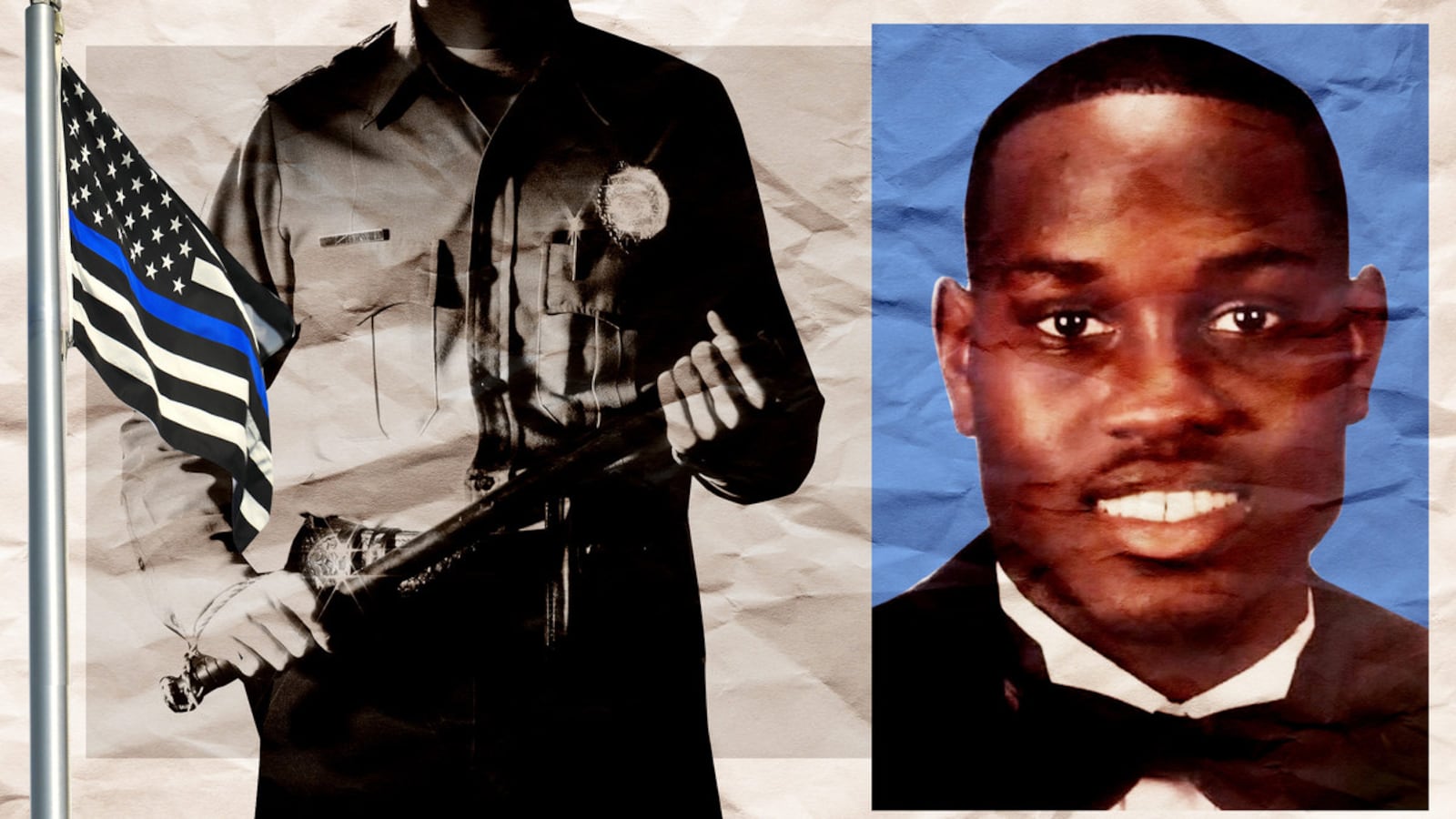SAVANNAH, Georgia—Allegations Friday that a Georgia district attorney blocked police officers from arresting the killers of 25-year-old Ahmaud Arbery were just the latest blow to a local law enforcement apparatus that has been rocked by a series of troubling and deadly scandals.
Brunswick DA Jackie Johnson’s office allegedly prevented the Glynn County Police Department from arresting Travis and Gregory McMichael in connection with the shooting death of Arbery, an unarmed black man, in late February, the Atlanta Journal-Constitution reported. Johnson has recused herself from that case. But one Glynn County commissioner suggested she personally intervened in early plans to make arrests “to protect her friend” Gregory McMichael. McMichael was a former cop and investigator in the Brunswick DA’s office for 25 years who had reportedly investigated Arbery in the past.
On Saturday, Glynn County released a statement defending the police department and deflecting blame to two district attorneys. The McMichaels were deemed not to be flight risks and officers were advised by the DA’s office that no arrests were necessary. Waycross District Attorney George Barnhill told detectives on Feb. 24 that the act was “justifiable homicide,” the statement said.
It is far from the first time the office—and local law enforcement more generally—had come under scathing scrutiny.
A decade ago, Johnson was responsible for overseeing the case of Caroline Small, an unarmed mother who led Glynn County police on a low-speed chase while possibly experiencing a mental breakdown. In June 2010, the responding officers—Michael Simpson and Robert Sasser —pinned Small’s vehicle between their squad cars and a telephone pole. They fired eight bullets through her windshield, striking Small in the head and face.
Afterward, Simpson and Sasser stopped paramedics from rendering aid to Small because they reportedly thought she was dead, but she wasn’t. Small lived for four days in a hospital before succumbing to her injuries.
“There is nothing I’ve seen in my life as egregious and wicked as the killing of Caroline Small,” said John Wetzler, a former assistant district attorney in the Brunswick DA’s office who said he knew Johnson when they were assistant prosecutors there together. “Even Atlanta doesn’t get the frequency of seismically shifting criminal scandals like Glynn County. [Glynn County police] are either paralyzed with indecision or corrupt to the core.”
Johnson, then an assistant district attorney, pushed out the interim DA who’d said he wanted to prosecute the officers over Small’s killing. That prosecutor told a Small family attorney that he believed he was replaced because of his intent to charge the officers. After he was removed, Johnson was appointed by then-governor Sonny Perdue. Upon taking over the case, she declined to present charges to a grand jury and instead asked jurors to simply determine whether the shooting was justified, according to the Atlanta Journal-Constitution.
Multiple attempts to reach Johnson’s office were unsuccessful on Friday. But in a statement released Friday night, Johnson denied claims that she had impeded an arrest in the Arbery killing, saying such allegations are “an attempt to make excuses and ignore the problems at the Glynn County Police Department, for which they are ultimately responsible.”
A spokesperson for the Glynn County Police Department did not answer questions from The Daily Beast. It was not clear if the McMichaels had retained lawyers.
Sasser, one of the two officers involved in Small’s killing, went on to kill his wife and her friend before turning the gun on himself in June 2018. He was out on bond at the time, after threatening his estranged wife at her home. After that, Sasser had attacked police officers during an armed standoff and was again released on bond, an agreement Johnson negotiated with a local judge. Out on that bond, he threatened his estranged wife and her male companion at a restaurant. Two days later, he killed the pair. (When The Brunswick News asked for Sasser’s personnel records in a public records request, former Glynn County Police Chief John Powell said that the records from the last six years of his tenure were missing, the newspaper reported.)
Legal experts also argued this week that Johnson should exonerate a man serving a life sentence for the 1985 murder of a husband and wife because new DNA evidence points to a different killer. Johnson has yet to respond to the findings. Her office has also been criticized by an investigator working for the family of a military veteran who was stabbed 13 times in the back in 2016, saying Johnson had a “perceived bias” against the victim, 26-year-old Taylor Williams. A grand jury declined to indict the lone suspect in the case for manslaughter.
The other side of Brunswick County courtrooms isn’t immune to controversy, either. The county’s former public defender was accused by the ACLU of charging clients for services that were supposed to be free and was arrested last year for allegedly punching and choking a woman.
Johnson’s office did try Zacharia Presley, a white police officer, for manslaughter in the shooting death of Tony Green, an unarmed black man, in 2018. Green was struck four times by Zacharia, an officer with the Kingsland Police Department who was acquitted of manslaughter and convicted of violating his oath. Green had filed several complaints against Presley prior to the shooting, his family has said.
Green’s father, Wayne Anderson, spoke at a rally over Arbery’s death at the Glynn County Courthouse on Friday.
“When I went through the trial for my son, the last thing I said: ‘I don’t ever want to see another parent go through this.' So that is why I am here,” he told the crowd.
For their part, Glynn County Police have come under so much scrutiny that a Republican state lawmaker has proposed allowing voters to decide whether they want to disband the department.
The senator, William Ligon, told The Daily Beast on Friday that the “leadership issues” within the Glynn County Police Department prompted him to introduce a bill that would give citizens a vote on whether to dissolve the police department and hand law enforcement duties to Glynn County Sheriff Neal Jump.
“When it was obvious that the individuals involved had ties to law enforcement, they should have immediately called the GBI,” Ligon said of the McMichaels and the state law-enforcement agency that ultimately secured their indictment on murder charges. “I think it’s tragic. I think they should have been arrested.”
On Friday, The New York Times reported that State Attorney General Chris Carr was poised to investigate the larger law-enforcement ecosystem.
Jump, for his part, has appeared to diverge from the pack. He attended a protest in Satilla Shores, the neighborhood where Arbery was killed, on Tuesday night, arrested the McMichaels on Thursday, and spoke at Friday’s rally in front of the courthouse. James Woodall, president of the Georgia NAACP, introduced Jump as “the man seen around the world.”
“It’s time we look beyond black and white, or green and yellow, and look at what’s right and wrong,” Jump said, to cheers. “We must remain steadfast in our beliefs and continue to move forward so that justice is done.”
But the department that responded to Arbery’s killing has had even more recent scandals.
On Feb. 28, Glynn County Police Chief John Powell was indicted, along with two officers and the police chief from nearby Vidalia, on charges of covering up crimes allegedly committed by members of the department’s drug task force. Former members of the since-disbanded task force were accused of suppressing evidence in a fatal police chase, sleeping and doing meth and cocaine with a confidential informant, carrying a handgun while drinking in a bar, coercing witnesses, and lying to the Georgia Bureau of Investigation about at least one of those instances of misconduct.
Ahmaud Arbery was shot and killed five days prior to the indictment.





